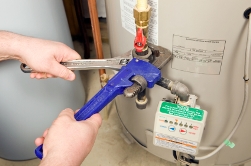Questions to Ask Plumber Tech Schools

Once you have made a decision to earn a diploma, certificate or degree, you can start to refine your school options. Since there are numerous plumbing tech and trade schools in the Boston MA area, it's essential to have a checklist of qualifications that each school must meet. The initial two that we mentioned were location and tuition expense. And while both qualifiers may be critical when making your decision, there are additional factors that must be considered also. Below is a checklist of those additional qualifications that you will need to research before selecting a plumber vocational school.
Is the Plumbing School Accredited? Numerous plumbing trade programs have attained either a regional or a national accreditation. They can receive Institutional Accreditation, which focuses on the school's programs overall, or Programmatic Accreditation, which pertains to a specific program, for example electrical technology. Make certain that the Boston MA school is accredited by a U.S. Department of Education recognized accrediting agency, such as the Accreditation Board for Engineering and Technology. Along with helping ensure that you receive an excellent education, it can help in acquiring financial aid or student loans, which are frequently unavailable for non-accredited schools. Also, many states require that the plumbing training course be accredited in order to be approved for certification or licensing.
Is the Plumbing School Licensed? Along with accreditation, an additional way of confirming that a trade school you’re considering is reputable is by making sure that it’s properly licensed. Licensing is typically controlled and regulated by state agencies, such as the Massachusetts Department of Education. If you’re not sure, ask the school which state agency is responsible for its licensing and then check to ensure that it’s up to date.
How Long has the School been in Business? Another means of determining the quality of a technical school is to find out how long it’s been in business. The longer a school has been in operation, the more likely that its programs are highly rated and regarded. Conversely, schools that are not well regarded or that provide low quality training generally don’t stand the test of time. However, keep in mind that even the best of Boston MA schools had to start from their first day of operation, so only use it as one of several qualifications for each school you are considering.
What are the School’s Completion and Placement Rates? Ask the plumbing schools you are considering what their completion rates are. The completion rate is the portion or percentage of students who enroll in and complete the course. A lower completion rate might indicate that students were unhappy with the program and quit. It might also signify that the teachers were not competent to train the students. It's also imperative that the schools have higher job placement rates. Older and/or more reputable schools may have a broader list of graduates, which may mean more contacts for the school to employ for their apprenticeship and job placement programs. A high job placement rate can not only affirm that the school has a good reputation within the field, but also that it has the network of contacts to help graduates secure apprenticeships or employment in the Boston MA area.
Are Apprenticeship Programs Sponsored? Most plumber vocational programs are taught together with an internship or an apprenticeship program. Those participating technical and vocational schools will help place you in an apprenticeship program inside their network of plumbing companies or trade unions. Check if the schools you are reviewing have working relationships with local Boston MA plumbers or plumbing professionals. An apprenticeship not only offers a valuable experience by providing practical training, but it also furnishes employment opportunities and helps to build relationships in the area plumbing professional community.
Are there Modern Facilities? Make certain that the campus facilities and the equipment that you will be instructed on are state-of-the-art and what you will be working with in the field. If you are already in an internship or an apprenticeship, talk to the master plumber you are working with regarding what you should be expecting. If not, ask a local Boston MA plumbing contracting company if they can give you some tips.
Where is the School Located? Unless you are willing to move, the school must be within driving distance of your Boston MA home. Take note that if you decide to attend an out-of-state school, besides the added relocation costs there can be higher tuition charges compared to in-state residents.
Are there Smaller Classes? It's desirable that you receive as much personalized training as possible, which can be challenging in bigger classes. Ask if you can sit in on a couple of the classes so that you can see how large they are and experience the interaction between students and instructors. Speak to some of the students and get their opinions concerning class sizes and instruction. Last, talk to a few of the teachers and learn what their level of experience is in Boston MA and what certifications or degrees they have earned.
Is the Class Schedule Convenient? Make sure that the class schedules for the programs you are assessing are flexible enough to meet your needs. If you can only go to classes at night or on weekends near Boston MA, confirm that the programs you are reviewing offer those choices. If you can only attend on a part-time basis, make sure that the school you select allows part-time enrollment. Additionally, ask what the protocol is to make-up classes should you miss any because of work, sickness or family issues.
